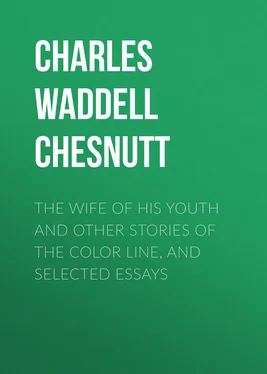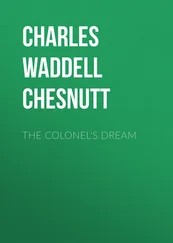Charles Waddell Chesnutt - The Wife of his Youth and Other Stories of the Color Line, and Selected Essays
Здесь есть возможность читать онлайн «Charles Waddell Chesnutt - The Wife of his Youth and Other Stories of the Color Line, and Selected Essays» — ознакомительный отрывок электронной книги совершенно бесплатно, а после прочтения отрывка купить полную версию. В некоторых случаях можно слушать аудио, скачать через торрент в формате fb2 и присутствует краткое содержание. Жанр: foreign_prose, foreign_antique, на английском языке. Описание произведения, (предисловие) а так же отзывы посетителей доступны на портале библиотеки ЛибКат.
- Название:The Wife of his Youth and Other Stories of the Color Line, and Selected Essays
- Автор:
- Жанр:
- Год:неизвестен
- ISBN:нет данных
- Рейтинг книги:5 / 5. Голосов: 1
-
Избранное:Добавить в избранное
- Отзывы:
-
Ваша оценка:
- 100
- 1
- 2
- 3
- 4
- 5
The Wife of his Youth and Other Stories of the Color Line, and Selected Essays: краткое содержание, описание и аннотация
Предлагаем к чтению аннотацию, описание, краткое содержание или предисловие (зависит от того, что написал сам автор книги «The Wife of his Youth and Other Stories of the Color Line, and Selected Essays»). Если вы не нашли необходимую информацию о книге — напишите в комментариях, мы постараемся отыскать её.
The Wife of his Youth and Other Stories of the Color Line, and Selected Essays — читать онлайн ознакомительный отрывок
Ниже представлен текст книги, разбитый по страницам. Система сохранения места последней прочитанной страницы, позволяет с удобством читать онлайн бесплатно книгу «The Wife of his Youth and Other Stories of the Color Line, and Selected Essays», без необходимости каждый раз заново искать на чём Вы остановились. Поставьте закладку, и сможете в любой момент перейти на страницу, на которой закончили чтение.
Интервал:
Закладка:
The crowd drew off a little, and the leaders conversed together in low tones.
The Branson County jail was a small, two-story brick building, strongly constructed, with no attempt at architectural ornamentation. Each story was divided into two large cells by a passage running from front to rear. A grated iron door gave entrance from the passage to each of the four cells. The jail seldom had many prisoners in it, and the lower windows had been boarded up. When the sheriff had closed the wicket, he ascended the steep wooden stairs to the upper floor. There was no window at the front of the upper passage, and the most available position from which to watch the movements of the crowd below was the front window of the cell occupied by the solitary prisoner.
The sheriff unlocked the door and entered the cell. The prisoner was crouched in a corner, his yellow face, blanched with terror, looking ghastly in the semi-darkness of the room. A cold perspiration had gathered on his forehead, and his teeth were chattering with affright.
"For God's sake, Sheriff," he murmured hoarsely, "don't let 'em lynch me; I did n't kill the old man."
The sheriff glanced at the cowering wretch with a look of mingled contempt and loathing.
"Get up," he said sharply. "You will probably be hung sooner or later, but it shall not be to-day, if I can help it. I 'll unlock your fetters, and if I can't hold the jail, you 'll have to make the best fight you can. If I 'm shot, I 'll consider my responsibility at an end."
There were iron fetters on the prisoner's ankles, and handcuffs on his wrists. These the sheriff unlocked, and they fell clanking to the floor.
"Keep back from the window," said the sheriff. "They might shoot if they saw you."
The sheriff drew toward the window a pine bench which formed a part of the scanty furniture of the cell, and laid his revolver upon it. Then he took his gun in hand, and took his stand at the side of the window where he could with least exposure of himself watch the movements of the crowd below.
The lynchers had not anticipated any determined resistance. Of course they had looked for a formal protest, and perhaps a sufficient show of opposition to excuse the sheriff in the eye of any stickler for legal formalities. They had not however come prepared to fight a battle, and no one of them seemed willing to lead an attack upon the jail. The leaders of the party conferred together with a good deal of animated gesticulation, which was visible to the sheriff from his outlook, though the distance was too great for him to hear what was said. At length one of them broke away from the group, and rode back to the main body of the lynchers, who were restlessly awaiting orders.
"Well, boys," said the messenger, "we 'll have to let it go for the present. The sheriff says he 'll shoot, and he 's got the drop on us this time. There ain't any of us that want to follow Cap'n Walker jest yet. Besides, the sheriff is a good fellow, and we don't want to hurt 'im. But," he added, as if to reassure the crowd, which began to show signs of disappointment, "the nigger might as well say his prayers, for he ain't got long to live."
There was a murmur of dissent from the mob, and several voices insisted that an attack be made on the jail. But pacific counsels finally prevailed, and the mob sullenly withdrew.
The sheriff stood at the window until they had disappeared around the bend in the road. He did not relax his watchfulness when the last one was out of sight. Their withdrawal might be a mere feint, to be followed by a further attempt. So closely, indeed, was his attention drawn to the outside, that he neither saw nor heard the prisoner creep stealthily across the floor, reach out his hand and secure the revolver which lay on the bench behind the sheriff, and creep as noiselessly back to his place in the corner of the room.
A moment after the last of the lynching party had disappeared there was a shot fired from the woods across the road; a bullet whistled by the window and buried itself in the wooden casing a few inches from where the sheriff was standing. Quick as thought, with the instinct born of a semi-guerrilla army experience, he raised his gun and fired twice at the point from which a faint puff of smoke showed the hostile bullet to have been sent. He stood a moment watching, and then rested his gun against the window, and reached behind him mechanically for the other weapon. It was not on the bench. As the sheriff realized this fact, he turned his head and looked into the muzzle of the revolver.
"Stay where you are, Sheriff," said the prisoner, his eyes glistening, his face almost ruddy with excitement.
The sheriff mentally cursed his own carelessness for allowing him to be caught in such a predicament. He had not expected anything of the kind. He had relied on the negro's cowardice and subordination in the presence of an armed white man as a matter of course. The sheriff was a brave man, but realized that the prisoner had him at an immense disadvantage. The two men stood thus for a moment, fighting a harmless duel with their eyes.
"Well, what do you mean to do?" asked the sheriff with apparent calmness.
"To get away, of course," said the prisoner, in a tone which caused the sheriff to look at him more closely, and with an involuntary feeling of apprehension; if the man was not mad, he was in a state of mind akin to madness, and quite as dangerous. The sheriff felt that he must speak the prisoner fair, and watch for a chance to turn the tables on him. The keen-eyed, desperate man before him was a different being altogether from the groveling wretch who had begged so piteously for life a few minutes before.
At length the sheriff spoke:–
"Is this your gratitude to me for saving your life at the risk of my own? If I had not done so, you would now be swinging from the limb of some neighboring tree."
"True," said the prisoner, "you saved my life, but for how long? When you came in, you said Court would sit next week. When the crowd went away they said I had not long to live. It is merely a choice of two ropes."
"While there 's life there 's hope," replied the sheriff. He uttered this commonplace mechanically, while his brain was busy in trying to think out some way of escape. "If you are innocent you can prove it."
The mulatto kept his eye upon the sheriff. "I did n't kill the old man," he replied; "but I shall never be able to clear myself. I was at his house at nine o'clock. I stole from it the coat that was on my back when I was taken. I would be convicted, even with a fair trial, unless the real murderer were discovered beforehand."
The sheriff knew this only too well. While he was thinking what argument next to use, the prisoner continued:–
"Throw me the keys—no, unlock the door."
The sheriff stood a moment irresolute. The mulatto's eye glittered ominously. The sheriff crossed the room and unlocked the door leading into the passage.
"Now go down and unlock the outside door."
The heart of the sheriff leaped within him. Perhaps he might make a dash for liberty, and gain the outside. He descended the narrow stairs, the prisoner keeping close behind him.
The sheriff inserted the huge iron key into the lock. The rusty bolt yielded slowly. It still remained for him to pull the door open.
"Stop!" thundered the mulatto, who seemed to divine the sheriff's purpose. "Move a muscle, and I 'll blow your brains out."
The sheriff obeyed; he realized that his chance had not yet come.
"Now keep on that side of the passage, and go back upstairs."
Keeping the sheriff under cover of the revolver, the mulatto followed him up the stairs. The sheriff expected the prisoner to lock him into the cell and make his own escape. He had about come to the conclusion that the best thing he could do under the circumstances was to submit quietly, and take his chances of recapturing the prisoner after the alarm had been given. The sheriff had faced death more than once upon the battlefield. A few minutes before, well armed, and with a brick wall between him and them he had dared a hundred men to fight; but he felt instinctively that the desperate man confronting him was not to be trifled with, and he was too prudent a man to risk his life against such heavy odds. He had Polly to look after, and there was a limit beyond which devotion to duty would be quixotic and even foolish.
Читать дальшеИнтервал:
Закладка:
Похожие книги на «The Wife of his Youth and Other Stories of the Color Line, and Selected Essays»
Представляем Вашему вниманию похожие книги на «The Wife of his Youth and Other Stories of the Color Line, and Selected Essays» списком для выбора. Мы отобрали схожую по названию и смыслу литературу в надежде предоставить читателям больше вариантов отыскать новые, интересные, ещё непрочитанные произведения.
Обсуждение, отзывы о книге «The Wife of his Youth and Other Stories of the Color Line, and Selected Essays» и просто собственные мнения читателей. Оставьте ваши комментарии, напишите, что Вы думаете о произведении, его смысле или главных героях. Укажите что конкретно понравилось, а что нет, и почему Вы так считаете.












